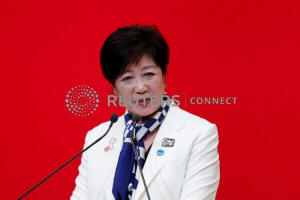|
The IOC on Wednesday announced a plan to move
the marathon and race walking events to Sapporo, on Japan's
northern island of Hokkaido, due to concerns about heat in Tokyo
next summer, a switch the Tokyo 2020 president said the city had
little choice but to accept.
Koike told a regular news conference on Friday, however, that
while she shared the IOC's emphasis on "athletes first" and
putting the priority on their health, she did not agree with the
decision and especially its suddenness.
She noted how much work Tokyo had put into heat-reducing
measures and that the Olympics were less than 300 days away.
"To choose Sapporo so suddenly - why Sapporo, who decided this?
There was no discussion, and I feel a lot of doubts about having
this thrust on us," she said.
"We have made many preparations and there's no change in my
thinking that it should be held in Tokyo."
Adding that many people in Tokyo had been looking forward to the
events, which Tokyo had planned in conjunction with IOC medical
advisors since being awarded the Games in 2013, she felt the IOC
owed the people of the Japanese capital an explanation.
"There's a (coordination commission) meeting at the end of the
month and I'd like to have more discussions on this," she said.
Tokyo has taken a number of steps to mitigate the crushing heat
of the Japanese capital in summer, including the use of mist
machines and pushing for earlier start times for the marathon
and race walking events.
Organisers had also planned to use heat-minimising pavement
along the race routes.
Asked if she felt angry about the way the decision was made,
Koike said her priority was making sure the Games succeed, part
of which included fanning interest among Tokyo residents and
making sure tickets are sold.
"I'm a bit worried that this may dampen interest in the Games
instead of promoting it," she added.
The Tokyo Olympics run from July 24-Aug. 9, a period when the
Japanese capital struggles with high heat and humidity. When
Tokyo last hosted the Summer Games in 1964 they were held in
October to avoid the heat.
(Reporting by Elaine Lies; Editing by Peter Rutherford)
[© 2019 Thomson Reuters. All rights
reserved.] Copyright 2019 Reuters. All rights reserved. This material may not be published,
broadcast, rewritten or redistributed.
Thompson Reuters is solely responsible for this content.
 |
|






